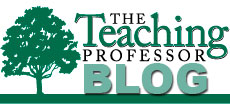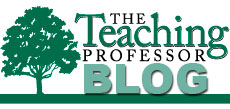A simple teaching technique that helps students learn; now there’s something few teachers would pass up! This particular technique involves a four-question set that gets students actively responding to the material they are studying. They analyze, reflect, relate, and question via these four prompts:
Read more ›CURRENT ARTICLE • August 28
OTHER RECENT ARTICLES
I don’t know if the first day of class is the most important day of the course, but I don’t think many of us would disregard its significance. What we do and how we do it matters. There are lots of good first-day activities—we’ve shared some in this blog over the years. In this post I’d like to move our thinking in a different direction and suggest five first-day essentials that go beyond the activities. These are the goals for the first day that we can use the activities to accomplish.
Read More ›Do you teach the way you learn? That’s the question Harold White asks in a short essay in which he recounts how he decided that he should. The catalyst was a faculty development workshop (more than 20 years ago) that featured an interesting activity. Participants were challenged to think about the most important lessons they had learned in life. They named six of these learning events, writing one on the front of six index cards. On the back of each card they wrote as much as they could remember about the circumstances that surrounded the events. Then they looked for patterns—things those learning events had in common. Where did they happen? In school or in less formal settings? How many involved teachers? What kind of feelings accompanied the learning? Was the learning hard? Was it planned or did it evolve out of unexpected circumstances? How often was the learning about correcting a misunderstanding, gaining a new insight, or deepening a current understanding?
Read More › “My students act so unprofessional,” a faculty member complained. “Two of them were all but making out before class started and they never stopped touching each other during class.” Heads nodded and more examples followed.
“My students act so unprofessional,” a faculty member complained. “Two of them were all but making out before class started and they never stopped touching each other during class.” Heads nodded and more examples followed.
 Like many matters regarding teaching and learning, there isn’t one best way to put students into groups. The best way is related to what you want students to learn from their group experience. Here’s a brief discussion of how that works for three common ways of forming groups.
Like many matters regarding teaching and learning, there isn’t one best way to put students into groups. The best way is related to what you want students to learn from their group experience. Here’s a brief discussion of how that works for three common ways of forming groups.
The July 2013 issue of Teaching of Psychology (40, 3) includes an “objective analysis” of the specifications and content coverage of 13 full-length introductory psychology textbooks. In six pages, teachers get a well-organized overview of introductory texts and a good feel for what those in the field consider important introductory course content. Scholarship like this makes a valuable contribution to the discipline.
Read More ›Every now and again I come across a quote that follows me around for the rest of the day, if not several days. That happened this week and here’s the quote, “I see myself as a learner first, thus I create my classes with learners, not for them ….”
Read More ›Dead ideas that limit teaching and learning—that was the topic of Professor Diane Pike’s plenary session at the recent Teaching Professor Conference. There’s a tyranny associated with dead ideas. They limit and constrain our thinking, and can lead us in the wrong direction. An idea may pass on without us noticing, and discovering it is dead can be provocative. Consider, for example, these three ideas that Pike proposed.
Read More › Group work and teamwork. In college courses the terms refer to students working together, often on an assignment or an activity. Group work is the more neutral term, whereas teamwork implies something about how the students are working together. And although teamwork is easy to identify when we see it on a playing field or court, what does teamwork look like in a college classroom?
Group work and teamwork. In college courses the terms refer to students working together, often on an assignment or an activity. Group work is the more neutral term, whereas teamwork implies something about how the students are working together. And although teamwork is easy to identify when we see it on a playing field or court, what does teamwork look like in a college classroom?
Here’s a great story. A graduate student is attending a lecture being given by one of her intellectual heroes, the Brazilian educator and theorist Paulo Freire. She takes notes furiously, trying to capture as many of his words as possible. Seeing that she is keenly interested in what Freire had to say, his translator asks if she would like to meet him. Of course! She is introduced and he begins by inquiring about her work. Then he graciously agrees to respond to a set of questions she and her colleagues hoped they would get the chance to ask him. She is impressed beyond belief, but time prevents her from asking one last, difficult question. They meet accidently once more at the event and he wonders if she asked all her questions? No, there is one more. “Given your work, we want to know ‘where is the hope’?” Without hesitating he moves toward her, takes her face in his hands, looks into her eyes, and replies, “You tell them, ‘you are the hope, because theory needs to be reinvented, not replicated … it is a guide. We make history as we move through it and that is the hope.”
Read More ›




